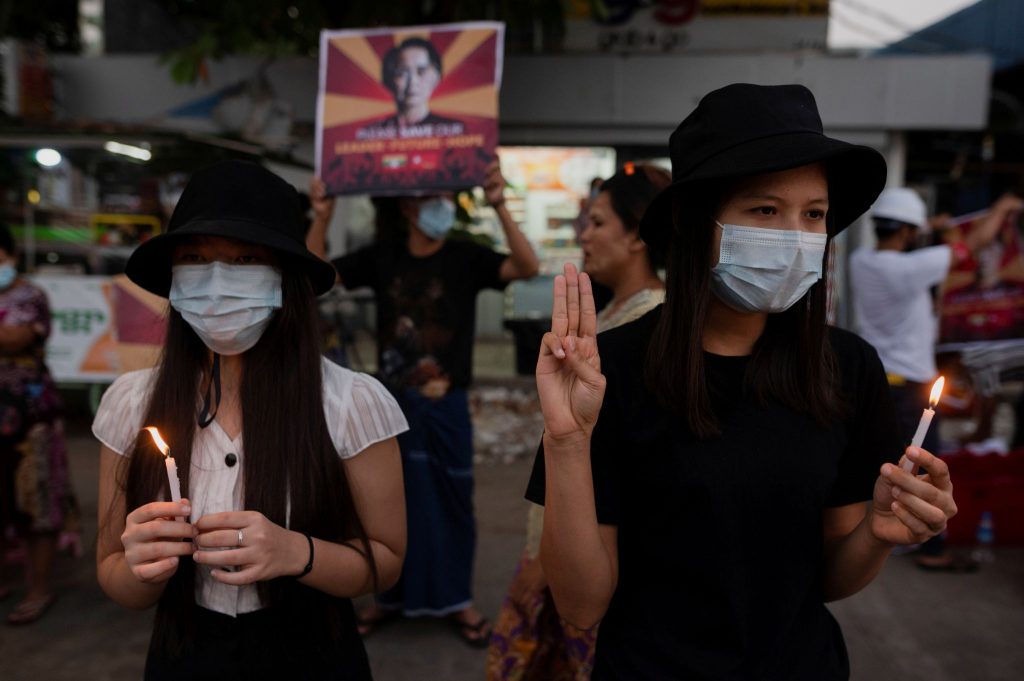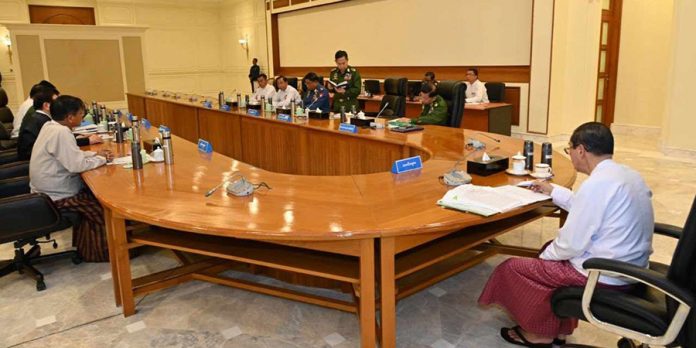FROM THE DVB NEWSROOM
State of emergency extended for another six months
The regime’s National Defense and Security Council (NDSC) extended Burma’s state of emergency by another six months at a meeting on Jan. 31. It justified the move under the military-drafted 2008 constitution, which stipulates that a state of emergency can initially last for one year but may be extended twice for six-months each.
A state of emergency was declared on Feb. 1, 2021 after the military ousted the National League for Democracy (NLD) government and jailed State Counsellor Aung San Suu Kyi and President Win Myint, replacing them in Naypyidaw with a regime led by Senior General Min Aung Hlaing.
Regime media cited the “extraordinary situation” in the country for its repeated extensions over the past year and as a necessary measure to maintain “stability” and to facilitate “multi-party elections.” A senior official in the military-proxy Union Solidarity and Development Party (USDP) said that an election may take place in 2025.
Activist group Progressive Voice released a statement on Jan. 31 calling on the international community to reject any regime-planned election. It said that an election held under the military would only be designed to legitimize its rule.
“The international community must halt any and all political, technical, financial, and material support to the military junta and its plans for a sham election,” said Khin Ohmar, the founder and chair of Progressive Voice.
Crisis Group states regime’s power uncertain
The International Crisis Group (ICG) Senior Myanmar Advisor Richard Horsey states that the regime’s grip on power is the weakest it has been in decades. He cautioned that the military has responded to resistance gains by attacking civilians.
“The military’s hold on power is more uncertain than at any time in the last 60 years. But it seems determined to fight on, and retains an enormous capacity for violence, attacking civilian populations and infrastructure in areas it has lost, using air power and long range artillery,” he said.
Horsey called on the U.N. Security Council and the Association of Southeast Asian Nations (ASEAN) to end the violence in Burma. He added that humanitarian assistance needs to be delivered to Internally Displaced Persons (IDPs) as well as to Rohingya refugees in Bangladesh.

UN human rights chief cites pain and misery of people in Burma
The U.N. High Commissioner for Human Rights Volker Türk reiterated that the deteriorating situation in Burma is in a “freefall” with “insufficient world attention paid to the misery and pain of its people.”
“As the military have suffered setback after setback on the battlefield, they have lashed out, launching waves of indiscriminate aerial bombardments and artillery strikes,” he said.
Türk added that 554 people have died since October and at least 1,600 civilians were reportedly killed last year. Since the 2021 coup, the Armed Conflict Location and Event Data Project (ACLED) has documented that 48,862 people have been killed in Burma. Read more here.
News by Region
ARAKAN—The Arakan Army (AA) announced that it had captured the Burma Army’s No. 379 Light Infantry Battalion (LIB) base in Kyauktaw on Jan. 30. It also released photos displaying the cache of weapons it seized.
The AA has taken control over several strategic military bases in Minbya and Kyauktaw townships. Intense fighting has been ongoing across northern and central Arakan. The AA has captured Pauktaw and Paletwa in southern Chinland.
CHINLAND—Seven civilians were killed by regime airstrikes on Holmes village, Paletwa Township, on Jan. 29. “They dropped bombs on the village despite there not being any clashes,” said a spokesperson of Chinland Defense Force (CDF) Daai.
KACHIN—A bomb was detonated near the home of N’Ban La, the chair of the Kachin Independence Organization (KIO/KIA) in Si Tar Pu ward of the capital, Myitkyina, on Jan. 30.
“Neighbors saw two unidentified men on a motorcycle put something on the fence. A very loud explosion occurred soon after,” said a resident. There were no reported casualties.
NAYPYIDAW—Ten alleged leaders of online scam syndicates, including Bai Xuoqian – the former chair of the Kokang Self-Administered Zone of northern Shan State, and his son Bai Yingcang – were handed over to Chinese authorities at the Naypyidaw International Airport on Jan. 30.
An unnamed source close to the regime’s Ministry of Home Affairs said that the 10 were being held in custody. Wai San (aka Wei Huai Ren), the chair of the military-backed Kokang Border Guard Force (BGF) was among those handed over.
The regime handed three relatives of Min Xuechang, a former Kokang official and member of the military-proxy Union and Solidarity Development Party (USDP), to Beijing on Nov. 16. Ming allegedly committed suicide during his arrest.
The regime announced that it had amended the Political Parties Registration Law again to allow parties to register with the Union Election Commission (UEC) if they have 50,000 members three months prior to an election date and open offices in at least one-third of all townships.
Forty-five political parties have registered with the UEC. But 40 other parties, including the NLD, were dissolved for failing to register in March 2023. The previous version of the law stipulated that a party needed 100,000 members and offices in half of all townships.



